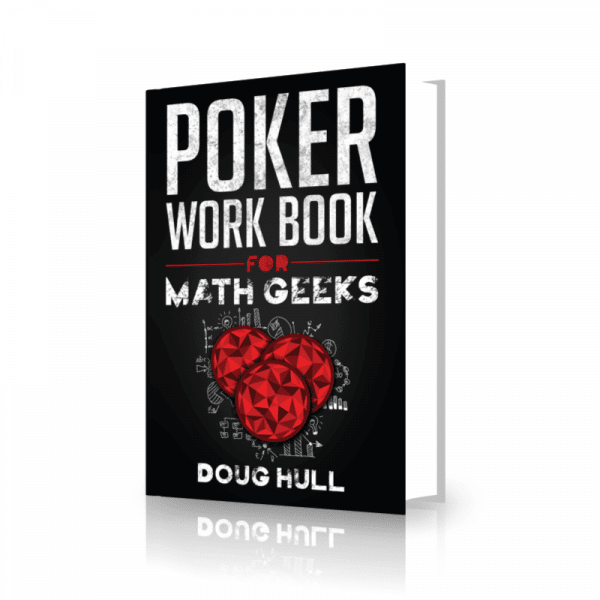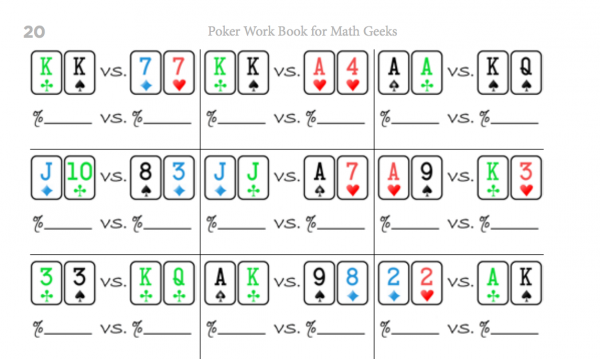We’re excited to announce the release of a new and unique poker strategy book from Doug Hull, Red Chip Poker founding coach and author of Poker Plays You Can Use.
 The new book is titled Poker Workbook for Math Geeks. True to its name, you’ll find hundreds of problems to solve, and clear instructions on building the skills to solve them.
The new book is titled Poker Workbook for Math Geeks. True to its name, you’ll find hundreds of problems to solve, and clear instructions on building the skills to solve them.
The book covers all the key decision points where math plays a large role — and that’s a lot of decision points. The book’s thoroughness is matched by its clarity, with Hull explaining complex concepts in easy-to-understand, digestible chunks. Pick up the book anytime like Sudoku for poker, or go cover-to-cover to build fundamentals. There’s never been a poker strategy book quite like it, and we’re very excited to be a part of its publishing.
To get some insight into how the new book came together, we spoke with Hull from his new Vegas headquarters, where he grinds, coaches, writes and analyzes poker from every angle:
You’ve described your new book, Poker Workbook for Math Geeks, as “like Sudoku for poker players.” Could you give us a sneak peek at the type of content we’re going to find inside?
Doug Hull: There are tons of spots where you need to know if you have the equity to call. I set up a series of poker exercises that get progressively tougher, making the math more approachable. We start with “Which hand is ahead pre-flop” progress to “You have this draw, the Villain shoved the Flop, do you call?”. Eventually we get to “The Villain bet this on the flop, you think he has this range, do you call?” and “How often must Villain fold if you shove this flop?”
The grinder scene is full of mathematically inclined people. How will your book improve their thinking at the table?
DH: The worksheet nature of the book reinforces the procedures. Hundreds of problems to flex your mental muscle on. By making it clear what the important part of the problem are you will later be able to improvise in unique situations.
Are you really doing lots of math in your head at the poker table? Or does it develop into more of an intuition? Or both?
DH: Both. When I get shoved on, I have time to think it through. When it is my turn to act, I will do rough approximations and rely on all the times I have done similar math away from the table. I also use these procedures to review hands afterwards to confirm what I did was right at the tables.
White writing the book, you sent out a Flop Equity Quiz and Turn Equities Decision Quiz to your loyal readers. What did you learn from the results? What are some common mathematical errors players make?
DH: In the quizzes that I put out there, I found that people were routinely off in their estimations of equity were off by 100%. So for instance, they though their equity was 20%, but it was actually 40%.
 For the non-mathematically inclined player, what are some areas they should focus on to make better analytical decisions at the poker table?
For the non-mathematically inclined player, what are some areas they should focus on to make better analytical decisions at the poker table?
DH: Practice is the key. Developing mental conversations and rough approximations. Do not try and use numbers like 23%, just call it 25%. There is not $47 in the pot, just call it $50. Rounding the numbers so that you can actually get the job done rarely changes the numbers significantly. If the difference between 50% and 47% matters, it is so close that the error is lost in the complexity and variance of Hold’em anyways.
What in your opinion is the most challenging yet important calculations to make while in the middle of a live game?
DH: Fold equity and drawing odds. When you bet big, you can win two ways. If you have big equity and can get them to fold, you are fairly bulletproof.
You recently quit your day job to move to Vegas and become a full-time grinder, coach and author. How’s that going?
DH: I am still getting acclimated to the desert. Been picking up lots of three-day intensives and I love that, seeing the progress after sweating a guy at the tables for three days.
